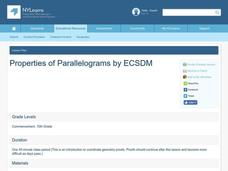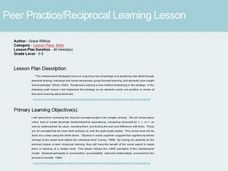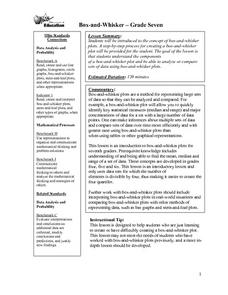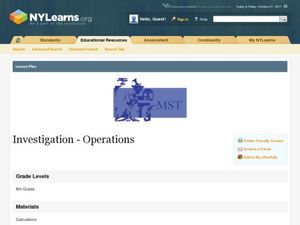Curated OER
Fun, Fun, Fun
Students participate in playing online games. In this practice lesson plan, students play online games to practice skills learned throughout the week.
Curated OER
Classifying Triangles Based On Properties of Angles
The interactive lesson featured here calls for the use of a Smartboard for sorting and classifying shapes. Then, pupils discuss the rules they followed for sorting their shapes, particularly focusing on the properties of angles. While...
Curated OER
Properties of Parallelograms
Students identify different properties of parallelograms. In this geometry lesson, students complete problems that proves the theorems and properties of parallelograms. They graph the different shapes on paper.
Curated OER
What's Your Symbol?
Sixth graders investigate how colors, objects and geometric shapes have been used symbolically in art during specific time periods. They use this information to create symbolic artwork and write a descriptive/informational piece...
Curated OER
Different! Diverse! Dynamic! Lesson 1: Late Bloomers
Learners examine how people grow and mature at different rates. They create a graph and a timeline to organize the data they collect.
Curated OER
The Mitten
Explore the Ukraine through a reading of The Mitten. Readers will determine the sequence of events, cause and effect, make predictions, and find the main idea of the story. They also use math skills to make charts and graphs. Finally,...
Curated OER
Reciprocal Learning-Decimal Review
Students use reciprocal learning to coach one another in review of their prior learning about decimals. In this peer reciprocal learning decimal review lesson, students participate in conversation, accountability, roles and...
Curated OER
Around the World With Geometry
Young scholars identify shapes, create shapes, and make a pyramid, a drum, and a sail using their shapes. In this shapes lesson plan, students also identify plane and space shapes.
Curated OER
How Fast is it Traveling?
Young scholars calculate the rate of speed of various moving objects within the classroom setting, or outside under a controlled environment.
Curated OER
Estimating Solutions to Word Problems
Fourth graders explore number sense by completing word problems in class. In this estimation lesson, 4th graders define terms such as sum, difference, estimate and best. Students complete estimating worksheets based on the concept of...
Curated OER
Box-and-Whisker
Seventh graders are introduced to the concept of box-and-whisker plots. A step-by-step process for creating a box-and-whisker plot is provided. The goal of the lesson is that students study the components of a box-and-whisker plot and be...
Ohio Department of Education
Number Subsets: Winning the Number Game - Grade Eight
Young leearners identify subsets of the real number system and play a number game to identify natural numbers, whole numbers, integers, rational and irrational numbers.
Curated OER
Understanding Symmetry Through Visual Art
Have your class explore symmetry, radial balance and fractional parts in natural and man-made objects in their environment. Learners list examples and identify symmetrical and asymmetrical designs. Pupils are given a box of crayons and...
Curated OER
Investigation-Operations
Sixth graders explore equations. In this math lesson, 6th graders discuss the rules for solving equations. Students apply the rules and solve various equations.
Curated OER
Leaves, Flowers, Seashells, Mirrors and Symmetry
Students develop an understanding of patterns and symmetry. In this symmetry and pattern lesson, students use real world patterns then analyze and extend them. Students also use real world items while discovering and observing...
Curated OER
Using Numbers in Everyday Situations
Students exercise the basic use of numbers in their everyday lives. In this numerical exercise, students discover the many ways numbers are used in everyday life. The students draw pictures showing examples of a time they have used...
Curated OER
Ten by Ten
Learners participate in hands-on activities using a hundreds chart and counting toes and fingers. They discover the patterns that are created when counting by ten. After a lecture/demo, students practice by using a worksheet embedded in...
Curated OER
Fish Communities in the Hudson
Learning to read data tables is an important skill. Use this resource for your third, fourth, or fifth graders. Learners will will study tables of fish collection data to draw conclusions. The data is based on fish environments in the...
Curated OER
ABC and 1-2-3 Farming
Students demonstrate how to alphabetize animal names. In this word study activity, students identify animals that live on the farm and conduct a favorite farm animal survey. Students order animal pictures in alphabetical order.
Curated OER
Tracking the Salt Front
Using the Hudson River as the focus, learners discuss the difference between salt water and fresh water environments, analyze maps and graphs, and complete addition and subtraction problems. This lesson comes with a wealth of...
Curated OER
Cultural Environment during the Great Depression
Eleventh graders research American culture of the Great Depression. For this role-playing lesson, groups of students develop "talking points" for their assigned topic and condense them into a Powerpoint or Hyper Studio presentation.
Prince William Network
Migration Headache
During this game, kids become migratory shorebirds and fly among wintering, nesting, and stopover habitats. If they do not arrive at a suitable habitat on time, they do not survive. Catastrophic events are periodically introduced that...
Curated OER
Let's Make Lemonade Lesson 3: What's the Big Idea?
Students examine and decide on a service-learning project to perform. They design and execute posters that advertise the project using geometric shapes.
Curated OER
Let's Make Lemonade Lesson 1: What is a Philanthropist?
Learners define the words philanthropists and philanthropy. They make flip books representing the story, The Lion and the Mouse and retell the story to a classmate.

























